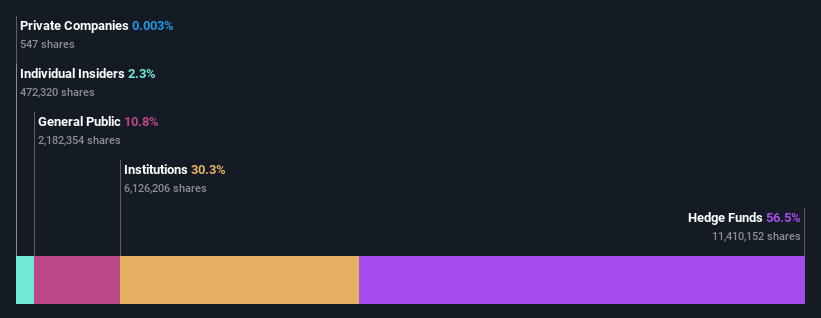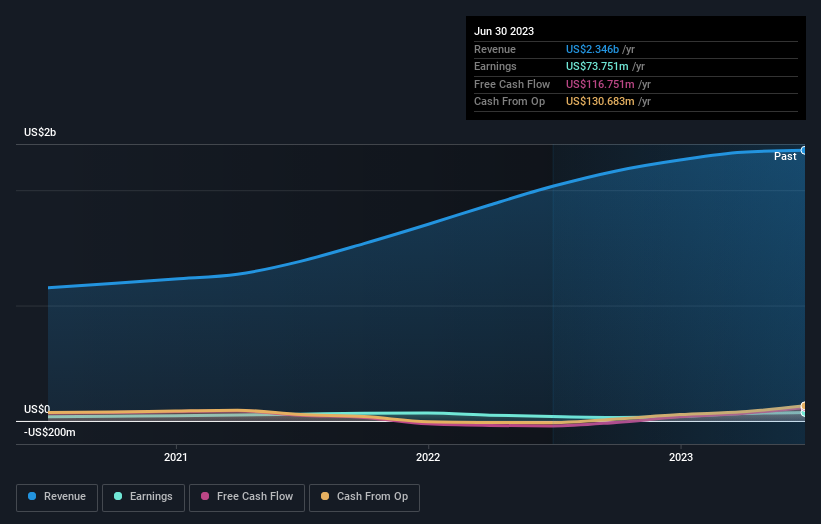Hedge funds investors have a lot riding on IES Holdings, Inc. (NASDAQ:IESC) with 57% ownership
Key Insights
Significantly high institutional ownership implies IES Holdings' stock price is sensitive to their trading actions
Tontine Management, LLC owns 57% of the company
Every investor in IES Holdings, Inc. (NASDAQ:IESC) should be aware of the most powerful shareholder groups. The group holding the most number of shares in the company, around 57% to be precise, is hedge funds. Put another way, the group faces the maximum upside potential (or downside risk).
And last week, hedge funds investors ended up benefitting the most after the company hit US$1.4b in market cap. One-year return to shareholders is currently 151% and last week’s gain was the icing on the cake.
Let's delve deeper into each type of owner of IES Holdings, beginning with the chart below.
View our latest analysis for IES Holdings
What Does The Institutional Ownership Tell Us About IES Holdings?
Institutions typically measure themselves against a benchmark when reporting to their own investors, so they often become more enthusiastic about a stock once it's included in a major index. We would expect most companies to have some institutions on the register, especially if they are growing.
We can see that IES Holdings does have institutional investors; and they hold a good portion of the company's stock. This can indicate that the company has a certain degree of credibility in the investment community. However, it is best to be wary of relying on the supposed validation that comes with institutional investors. They too, get it wrong sometimes. When multiple institutions own a stock, there's always a risk that they are in a 'crowded trade'. When such a trade goes wrong, multiple parties may compete to sell stock fast. This risk is higher in a company without a history of growth. You can see IES Holdings' historic earnings and revenue below, but keep in mind there's always more to the story.
It looks like hedge funds own 57% of IES Holdings shares. That's interesting, because hedge funds can be quite active and activist. Many look for medium term catalysts that will drive the share price higher. Looking at our data, we can see that the largest shareholder is Tontine Management, LLC with 57% of shares outstanding. With such a huge stake in the ownership, we infer that they have significant control of the future of the company. In comparison, the second and third largest shareholders hold about 4.9% and 3.5% of the stock. In addition, we found that Jeffrey Gendell, the CEO has 0.7% of the shares allocated to their name.
Researching institutional ownership is a good way to gauge and filter a stock's expected performance. The same can be achieved by studying analyst sentiments. We're not picking up on any analyst coverage of the stock at the moment, so the company is unlikely to be widely held.
Insider Ownership Of IES Holdings
The definition of an insider can differ slightly between different countries, but members of the board of directors always count. Company management run the business, but the CEO will answer to the board, even if he or she is a member of it.
Insider ownership is positive when it signals leadership are thinking like the true owners of the company. However, high insider ownership can also give immense power to a small group within the company. This can be negative in some circumstances.
Our most recent data indicates that insiders own some shares in IES Holdings, Inc.. This is a big company, so it is good to see this level of alignment. Insiders own US$34m worth of shares (at current prices). Most would say this shows alignment of interests between shareholders and the board. Still, it might be worth checking if those insiders have been selling.
General Public Ownership
With a 11% ownership, the general public, mostly comprising of individual investors, have some degree of sway over IES Holdings. While this size of ownership may not be enough to sway a policy decision in their favour, they can still make a collective impact on company policies.
Next Steps:
I find it very interesting to look at who exactly owns a company. But to truly gain insight, we need to consider other information, too.
Many find it useful to take an in depth look at how a company has performed in the past. You can access this detailed graph of past earnings, revenue and cash flow.
Of course this may not be the best stock to buy. Therefore, you may wish to see our free collection of interesting prospects boasting favorable financials.
NB: Figures in this article are calculated using data from the last twelve months, which refer to the 12-month period ending on the last date of the month the financial statement is dated. This may not be consistent with full year annual report figures.
Have feedback on this article? Concerned about the content? Get in touch with us directly. Alternatively, email editorial-team (at) simplywallst.com.
This article by Simply Wall St is general in nature. We provide commentary based on historical data and analyst forecasts only using an unbiased methodology and our articles are not intended to be financial advice. It does not constitute a recommendation to buy or sell any stock, and does not take account of your objectives, or your financial situation. We aim to bring you long-term focused analysis driven by fundamental data. Note that our analysis may not factor in the latest price-sensitive company announcements or qualitative material. Simply Wall St has no position in any stocks mentioned.


